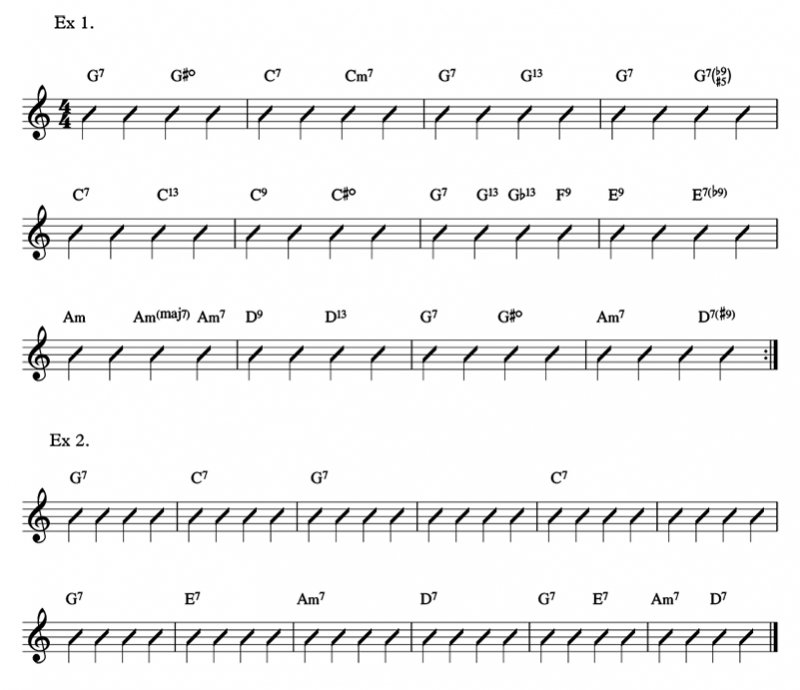Guitar Cool: Vanilla Chords
Guitar Cool: Vanilla Chords
‘ Vanilla chords ‘ is a term used in the jazz guitar world which essentially means you need to reduce the chord progression being studied to its most basic form.
Take a quick look at Exercise 1. You will see music written like this in a lot of pop, jazz, and blues music, along with stage plays, film scores, etc.
A question I get asked a lot by players new to advanced chord formulas is how to memorise chord progressions with many chords? (Especially when most of those chords have extensions added to them like those shown!)
Just in case you can’t see, the chord progression is a standard jazz 12- bar blues as written in Exercise 2. What you need to do is play and memorise the vanilla chords in Ex 2. first before doing anything like in Ex 1.
Ex 2. is relatively easy to memorise if you think of it this way – one bar of the 1 chord, followed by one bar of the 1V chord, then there are two bars of each, which completes the first six measures. Then there is a 1, vi, ii, V progression covering a bar each, followed by the same chords for two beats each. It is that simple.
If you look at Ex 1. you can see the outline of the vanilla chord version, although in some songs it is difficult to do this. You can see the vanilla chords on beat 1 of each bar. (Just in case you’re not aware, C9 is just a substitute chord for C7.)
If you don’t know how to play any of the chords in Ex. 1 don’t worry as you will be able to later on as you learn and advance more. Those chords are not easy to learn. Although not advanced by any measure, it does take many guitarists a bit of time to get to that level.
Once you do have the vanilla chords completely memorised, then you add the extensions you hear in your head. Mostly those extensions will involve things like counter melodies and voice leading techniques, which can get quite advanced. You really don’t need to know the advanced stuff to have fun and play with your friends, but you will need to know the vanilla forms of the songs you are playing.
Having the vanilla chords in mind makes it easier to solo as well. Have the vanilla chords running through your head while improvising over those chords in Ex 1. By keeping things simple and easy when you begin you’ll find you have more fun playing your guitar.
If you find this stuff is interesting but maybe too challenging, it might pay to consult a good guitar teacher who teaches this sort of thing.
Kevin Downing is a professional guitarist, teacher, and author based in Palmerston North. His contact details, along with many freebies, are on his website at www.guitar.co.nz

